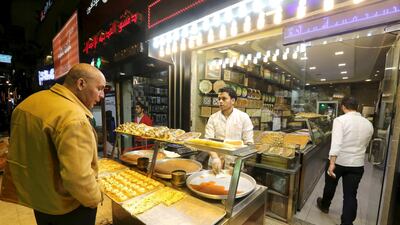Lawyer Samir Sabry could not have anticipated the popular rage and dismay he provoked over a letter he wrote to Egypt's chief prosecutor requesting an investigation into the source of "conspicuous wealth" enjoyed by Syrian businessmen who have come to Egypt to escape their country's civil war.
A self-declared protector of morality who has earned national fame for his vigilante discourse, Mr Sabry also said in the letter he posted on his official Facebook page that he wanted authorities to look into whether Egypt was taxing Syrian businesses.
Mr Sabry, in his late 60s, has in recent years made a name for himself as an uncompromising supporter of the government who went after celebrities, clerics, politicians and even television shows that he perceived to have shown less than blind loyalty to Egypt, infringed on morality or breached traditions.
Taking advantage of a law allowing a citizen to lodge a criminal complaint against another, Mr Sabry routinely writes to the chief prosecutor detailing the alleged breaches and supports his accusations with evidence; often video, audio or newspaper clips. Prosecutors shelve most cases, but they investigate the remainder, summoning the alleged culprits for questioning and referring them to trial if there is enough to suggest a crime was committed.
Mr Sabry sees himself as a patriot above all, a reformer and a protector of society. However, critics view him as a paranoid vigilante and a deterrent against anyone who, in his view, challenges societal norms or the government.
The list of his victims includes a belly dancer, a famous singer, a young prize-winning novelist and a former presidential candidate. Some of those convicted on the strength of his complaints served prison terms.
His latest case – against wealthy Syrians in Egypt – may have gone too far and could give Mr Sabry a taste of his own medicine, with some calling for him to be charged with hate speech or incitement. Ominously for him, his take on the Syrians contrasts, at least in spirit, with the official narrative embraced by the government on refugees.
For years, Egypt has told the world that the five million refugees – the figure used by officials – who live in the country enjoy the rights and privileges accorded to Egyptians and that they blend in with the local population, rather than be confined to camps as the case is elsewhere in the region.
Besides the estimated 500,000 Syrians here, the Sudanese, Libyans, Iraqis and Yemenis make up the largest refugee communities in Egypt. But unlike the picture painted by Mr Sabry, most Syrian refugees in Egypt struggle to make ends meet, with most of them making a living as plumbers, carpenters, cooks or bakers or selling their country's famous sweets at Cairo's traffic lights.
Many of Mr Sabry's critics, along with ordinary Egyptians, have taken to social media since the weekend to accuse him of hate speech or outright racism and declaring their affection for the Syrians who have made Egypt their home since the uprising in their home country in 2011 descended into civil war.
"Doesn't this discourse against our Syrian brothers constitute hate and racism speech that's punishable by the law?" wrote Nour Farahat, one of Egypt's top legal experts. "Until when should we remain silent on this suspicious and hateful discourse? Every Egyptian home is a home for the honourable people of Syria."
The online uproar and expressions of solidarity have combined to shoot the hashtag "#SyriansareWelcomeinEgypt" to the top slot in Egypt, a country of 100 million people where social media is one of just a handful of platforms of free speech.
The reaction on social media in support of the Syrians contrasted sharply with a wave of xenophobia and hate attacks that Syrians living in the country endured in 2013 when some Egyptians associated them with the divisive rule of Mohammed Morsi, an Islamist president removed by the military in July that year amid mass protests against his policies. During his one year in office, Morsi severed diplomatic relations with President Bashar Al Assad's government and threw his government's support behind his mostly Islamist rebel foes.
In his letter, published on Saturday, Mr Sabry listed how, in his words, parts of Cairo, the Egyptian capital, have attracted so many Syrians that they have become "Little Syria". Sarcastically, he said the Syrians’ "sweet talk and smile" ensured their continuing stay in Egypt.
He then moved on to say that Syrians in Egypt have invested a total of $23 billion – he did not say how he arrived at this figure – and asked whether their diverse business activities were subjected to official scrutiny to determine whether they were being taxed and how the funds entered Egypt in the first place.
"One is shocked by the excessive luxury and the extravagant patterns of consumption adopted by many of these Syrians," Mr Sabry wrote. "Anyone following their conduct in restaurants, cafes, clubs and shopping malls will not believe that these are the same children of the Syria ravaged by destruction, killings and displacement."
Mr Sabry's words earned him mockery and wrath on social media, with many using expletives to refer to him and his discourse on the Syrians in Egypt. Significantly, the uproar came from a wide range of Egyptians, many of them framed the arrival of Syrians in Egypt as a refreshingly positive development or a silver lining of their country's civil war.
"Egyptians treat Syrians as a prize that came into their life," wrote artist Ahmed Al Labad on Facebook.
"Those Syrians are the best thing that Egypt got from the Arab Spring!" Khaled Mohyeldeen posted.


